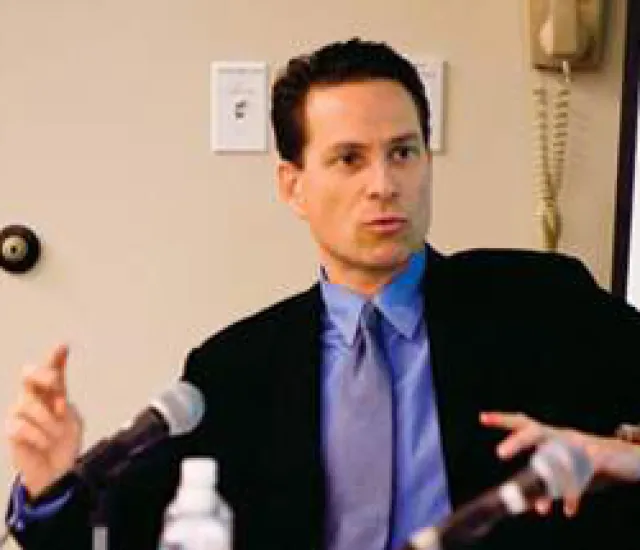If hedge fund managers and Wall Street pros wonder why the average person thinks they are greedy and the deck is stacked in their favor, Tuesday’s JPMorgan collateralized debt obligations (CDO) settlement is yet another good reminder.
For at the core of the complaint is the realization that while the average schnook was being peddled a package of crappy mortgages, a major hedge fund — Magnetar Capital — was able to personally go in and select the crappiest of the turd so it can take the opposite side of the trade and short the portfolio.
Nice deal if you can get it.
Then, presto — they reportedly made hundreds of millions of dollars. And everyone lauded founder Alec Litowitz and his cohorts as these savvy, smart guys celebrated for having previously worked for another boy wonder, Ken Griffin of Citadel.
But, now, alas, JPMorgan Chase has run afoul with the Securities and Exchange Commission and agreed to pay $153.6 million to settle civil charges on the grounds that it misled investors in the complex mortgage securities deal just as the housing market was starting to plummet. According to the SEC’s complaint, the CDO known as Squared CDO 2007-1 was structured primarily with credit default swaps referencing other CDO securities whose value was tied to the U.S. residential housing market. The regulator points out that JPMorgan’s marketing materials said the portfolio was selected by GSCP (NJ) L.P. – the investment advisory arm of GSC Capital Corp. (GSC).
However, it omitted the fact that Magnetar played a significant role in selecting CDOs for the portfolio and stood to benefit if the CDOs defaulted, according to the SEC.
“J.P Morgan marketed highly-complex CDO investments to investors with promises that the mortgage assets underlying the CDO would be selected by an independent manager looking out for investor interests,” said Robert Khuzami, the SEC’s aggressive Director of the Division of Enforcement, said in a statement. “What J.P. Morgan failed to tell investors was that a prominent hedge fund that would financially profit from the failure of CDO portfolio assets heavily influenced the CDO portfolio selection.”
The SEC alleges that by the time the deal closed in May 2007, Magnetar held a $600 million short position that dwarfed its $8.9 million long position. The SEC notes that in an internal e-mail, a J.P. Morgan employee noted, “We all know [Magnetar] wants to print as many deals as possible before everything completely falls apart.”
Under the settlement, unsuspected investors who lost money will receive all of their money back. So, there is some justice here.
Magnetar, however, did not violate any SEC rules. All they did is create the portfolio to short.
JPMorgan, however, got in trouble for not disclosing this fact. The SEC separately charged Edward Steffelin, who headed the team at GSC Capital that the deal’s marketing materials said had selected the CDO’s portfolio. The complaint alleges that Steffelin drafted and approved marketing materials promoting GSC’s selection of the portfolio without disclosing Magnetar’s role in the selection process. In addition, unknown to investors, Steffelin was seeking employment with Magnetar while working on the transaction.
The upshot, of course, is that while it was not accused of wrongdoing under SEC rules, we now do know that Magnetar was not as smart as they seemed.
If this sweet heart arrangement sounds very familiar, it does. For this is a major way John Paulson went from mediocre, unknown hedge fund manager to super smart, multi-billionaire hedge fund manager whose every move is watched as close as an inmate on suicide watch.
Last April we learned that Paulson also made big bucks while not operating on a totally level playing field.
According to the SEC complaint at the time, the regulator charged Goldman, Sachs & Co. and one of its vice presidents for defrauding investors by misstating and omitting key facts about a financial product tied to subprime mortgages as the U.S. housing market was beginning to falter. Its complaint alleged that Goldman created and sold a CDO to Paulson that hinged on the performance of subprime residential mortgage-backed securities (RMBS).
However, the investment banking giant failed to disclose the role that Paulson played in the portfolio selection process and the fact that the hedge fund had shorted the RMBS portfolio it helped select by entering into credit default swaps (CDS) with Goldman Sachs.
The SEC alleged that Paulson & Co. paid Goldman to structure a transaction in which Paulson & Co. could take short positions against mortgage securities chosen by Paulson & Co. against the securities he picked to be in “based on a belief that those securities would experience credit events.”
The regulator also alleged that after participating in the portfolio selection, Paulson & Co. effectively shorted the residential mortgage backed securities portfolio it helped select by entering into credit default swaps (CDS) with Goldman Sachs to buy protection on specific layers of the CDO known as ABACUS 2007-AC1.
“Given that financial short interest, Paulson & Co. had an economic incentive to select RMBS that it expected to experience credit events in the near future,” the SEC stated at the time.
Paulson made $1 billion on the deal, according to the SEC. Paulson was not sued by the SEC, which can only bring civil cases. "We charged those that we felt were appropriate based on the evidence," Khuzami said during a conference call at the time. "Goldman made representations to investors, and Paulson did not."
Are the Magnetar and Paulson cases one off situations? Are you new to following Wall Street?
What these two deals tell us is that these kinds of sweet heart deals occur frequently. We only learned about these because the new SEC administration is determined to punish someone for the financial crisis that resulted in the financial institutions staying in business thanks to a government bailout, enabling their stocks to recover, and two years later their self-important rank and file, whose swagger suggests a feeling of entitlement, to get their big bonuses again.
Did I tell you that the unemployment rate is still 9.2 percent and the “real” unemployment rate, which includes the underemployed and the discouraged, is closer to 15 percent? Okay, now I did.
Now, keep in mind that already 49 hedge-fund managers and others have been charged in the SEC’s current insider trading scandal. Think of how many of the 49’s co-workers are still sweating out the investigation for fear they will be nailed next.
It is this rampant straddling of the rules — sometimes the line is crossed and sometimes only in spirit — that most irks the rest of us schnooks.
We only hope that the recent insider trading convictions and plea agreements and the SEC settlements will at least scare those still working on Wall Street from breaking the law in the future. Afterall, they have to fear being caught and going to prison for them to stop.
After decades of scandals, we know morality — and passing the smell test--rarely seems to figure into the equation.







